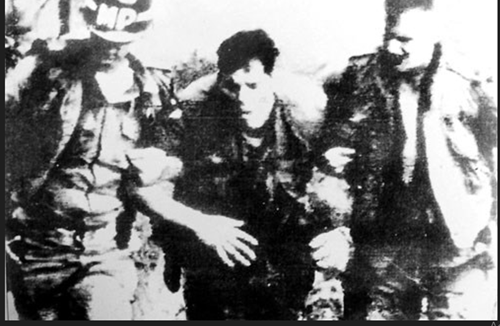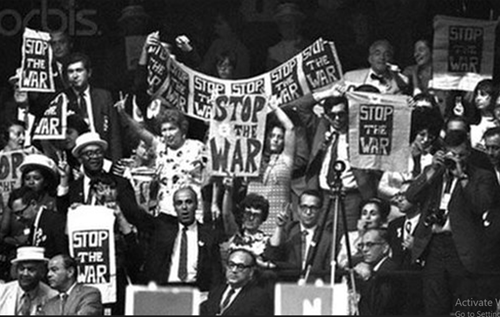Fighting boldly and bravely, the Vietnamese armed forces ground down the enemy’s strength, destroyed and damaged a lot of the enemy means of warfare, dealt a great blow to the U.S. troops on the battlefield in Vietnam, reduced the position and influence of the Saigon government and troops, and shocked Washington’s senior leaders.
On March 30, 1968, General Westmoreland, Commander-in-Chief of the U.S. Army in Vietnam arrived in Saigon to disseminate the U.S. government's policy of "De-Americanizing” the war. This policy replaced President Johnson's policy of "Americanizing" the war (Local war) which failed previously.
    |
 |
|
U.S. soldiers injured when special forces attacked the U.S. Embassy in Sai Gon during the lunar New Year (Tet) 1968 (An archived photo) |
On March 31, 1968, President Johnson announced that he would not run for presidency for the second term, as well as his decision to limit U.S. activities in Vietnam. He also ordered limitation of bombarding the North from the 20th parallel northwards (and completely stopping bombing the North since November 1, 1968) and sent negotiators to the two-party negotiation from May 13, 1968. That announcement was the U.S.’s admission of its defeat in the "Local war" in the South. The Mau Than General Offensive and Uprising in 1968 and its strong effects, along with the upheavals in the world and the U.S. forced the U.S. leaders to re-consider their entire course and method of conducting the war in Vietnam and their global strategy.
To meet the requirements of the global strategy, the U.S. must calculate to shorten the time of the war in Vietnam. The 1968 Spring General Offensive and Uprising ended the Johnson administration's illusion of "fight fast, win fast," presented to the U.S. forces the prospect of "a war that would never end" which the U.S. side could not stand. Since 1968, right in the Johnson administration, the conflict between the group that advocated to wage the war to the end and the group that advocated finding a way out through negotiation or a conciliatory measure became more and more tense.
    |
 |
|
Protesters in Chicago (the U.S.) demanding an end to the war in Vietnam, 1968 (Photo: Arthur Rothstein) |
The group of high-level U.S. advisors on Vietnam built a scenario for President Johnson to have a long withdrawal divided into many waves in order to save as much honor and prestige as possible. In forums, Senators McCarthy and F. Kennedy tried to challenge the party's nomination for Johnson. The Congress canceled its approval given to the White House in the Gulf of Tonkin Resolution. The U.S. House of Representatives also decided to withdraw all U.S. troops in Vietnam in the shortest time.
After the Tet Offensive in 1968, the U.S. people's anti-war movements, demanding the government withdraw troops from Vietnam, flared up again. Press and media representatives of the business world, such as the Wall Street Journal, increasingly questioned the wisdom of the war in Indochina. The U.S. defied international law and realized its global strategy in an attempt to expand its power and influence. In fact, its missteps in the global strategy caused mistakes in Vietnam. After the defeat, the U.S. only learned one thing that their advanced and modern weapons could not conquer the fighting spirit of the Vietnamese people. By 1982, up to 70% of Americans had considered the war in Vietnam basically wrong and unethical.
Holding strategic importance, the Mau Than General Offensive and Uprising in 1968 caused a concussion that shook the will of the White House and the Pentagon’s leaders. After the Tet Offensive, the U.S. clearly realized that its "Local war" failed, and the global strategy "Flexible response" was in danger of bankruptcy. Even before he was assassinated, Kennedy had seen that the "Flexible response" strategy piloted in Vietnam did not bring about the desired outcomes. The clearest "answer" for the deletion of this strategy was the Mau Than General Offensive and Uprising in 1968 in Vietnam where the U.S. did not flexibly respond to the secret and sudden offensives of Southern troops and people.
Translated by Mai Huong